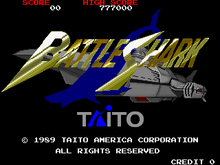Battle Shark
Battle Shark (バトルシャーク) is a first person shoot 'em up arcade game released in 1989 by Taito. The player looks through a submarine periscope in order to destroy enemies, featuring simulated damage whenever the player gets hit by either an enemy torpedo or a missile.
| Battle Shark | |
|---|---|
 Battle Shark arcade title screen | |
| Developer(s) | Taito |
| Publisher(s) | Taito |
| Designer(s) | Atsushi Yamamoto |
| Platform(s) | Arcade PlayStation 2, Xbox, Windows (home versions on Taito Legends) |
| Release | July 19, 1989 |
| Genre(s) | Shooter game |
| Mode(s) | Single player |
| Cabinet | Horizontal |
| Arcade system | Taito Z System hardware |
| CPU | 68000 |
| Sound | YM2610 |
| Display | Raster, 320 x 240 pixels, 4096 colors |
The player starts off with a limited amount of torpedoes, which slowly replenishes itself, so players must shoot accurately. Power-up targets appear throughout the games, which can increase the player's supply of torpedoes, repairs damage or add extra firepower in addition to the torpedoes. At the end of each stage, the player faces off against a Boss character.
The game was released for Taito Legends in 2005.
Plot
The story in Battle Shark involves a third world war (World War 3 or WWIII). According to the description in the game's attract mode introduction, "extremely brutal fighting has been taking place on land, and now the battlefield is expanding into the oceans."
Peace negotiations, the fictional allies then discover, are an enemy trap, and that the enemy has actually been buying time to create an underwater fortress at the bottom of the sea.
Battle Shark, with its driver, a navy soldier, must fight its way through hordes of enemy submarines, boats, and vehicles to track down the fortress, and ultimately destroy it.
Reception
In Japan, Game Machine listed Battle Shark on their May 1, 1990 issue as being the sixth most-successful upright arcade unit of the year.[1]
References
- "Game Machine's Best Hit Games 25 - アップライト, コックピット型TVゲーム機 (Upright/Cockpit Videos)". Game Machine (in Japanese). No. 379. Amusement Press, Inc. 1 May 1990. p. 29.